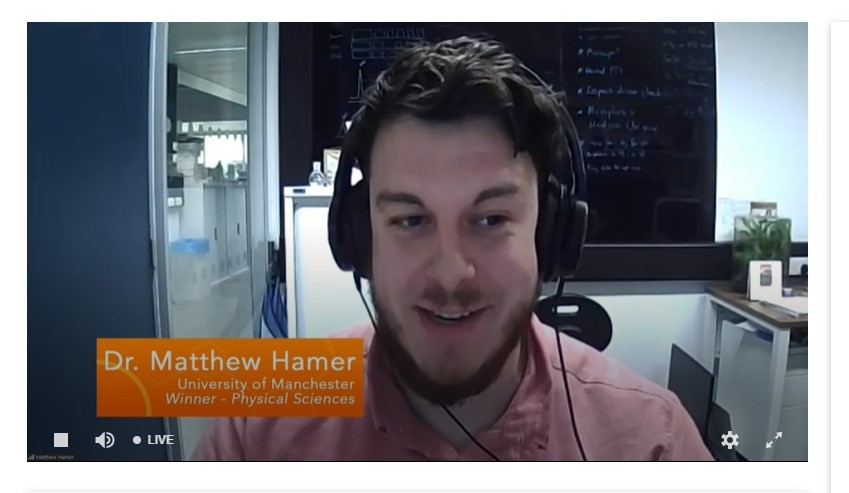NGI post-doc wins Elsevier early-career research award
Dr Matthew Hamer has won the Physical Science category of the Scopus Early Career Researcher (ECR) UK Awards 2020 for his work with graphene and other 2D materials.
Matthew, a postdoctoral research associate working in the National Graphene Institute (NGI), makes nanoscale devices through the building of heterostructures: layers of one-atom-thick sheets of material that can be fine-tuned to exhibit novel properties such as superconductivity.
Of particular note, Matthew’s research is conducted with materials that degrade under ambient conditions, for example, indium selenide. Traditionally, such materials would be created and worked upon in a glovebox environment with an inert gas such as argon used to prevent deterioration. However, under ‘ultra-high-vacuum’ conditions (in the NGI's UHV suite pictured below), Matthew has been able to produce substantially higher-quality samples and therefore better device quality.
“The high quality of the samples allows us to measure physical properties that we might not otherwise be able to observe,” says Matthew. “For example, unconventional superconductivity or electron-electron interactions.
“With these very pristine interfaces, the layers have fewer impurities and defects, so the crystal structure can be of higher quality, and we can see effects that might otherwise be ‘blurred out’, so to speak, because of background interference.”
Winners receive cash grants
Matthew and his fellow winners were shortlisted from thousands of published researchers on Elsevier’s Scopus database - based on number of citations and quality of publication - and then submitted to a panel of judges chaired by Professor Sir Steve Smith, the UK Government’s International Education Champion and former Vice-Chancellor of the University of Exeter. The winners each receive a £1,500 grant from Elsevier.
“We are pleased to once again support talented researchers to advance knowledge and make a positive impact on society,” said Maria Balinska, Executive Director of the US-UK Fulbright Commission, which has partnered with Elsevier in the ECR Awards since 2011. “Through the awards we hope to recognize the significant contribution of early career researchers, as well as the institutions enabling them to progress in their careers.”
Director of the National Graphene Institute, Vladimir Falko, said: “Matthew made a number of extremely high-quality samples of non-graphene two-dimensional materials, which made possible characterisation of these materials using a range of microscopy and spectroscopic techniques. This was particularly important for achieving the detailed understanding of optoelectronic properties of atomically thin films of indium selenide.”
Dr Roman Gorbachev, the Senior Research Fellow with whom Matthew works most closely at the NGI, commented: “Matthew’s world-class expertise in 2D nanofabrication - and passion for optimising the approach for challenging materials such van der Waals heterostructures - have made him an invaluable part of Manchester's research focus on novel 2D materials.”
Reflecting on the award, Matthew added: “It was a bit out of the blue, to be honest. But it’s a really good validation of the research that I’m doing. It’s nice to feel appreciated. And it’s not just me - it’s good for everyone that I’m working with, all of the collaborations. It’s good to know that people are reading my research and finding it useful.”
You can find out more about the Scopus ECR Awards on Elsevier’s website and you can read an extended interview with Matthew on the Graphene blog.
Advanced materials is one of The University of Manchester’s research beacons - examples of pioneering discoveries, interdisciplinary collaboration and cross-sector partnerships that are tackling some of the biggest questions facing the planet. #ResearchBeacons




